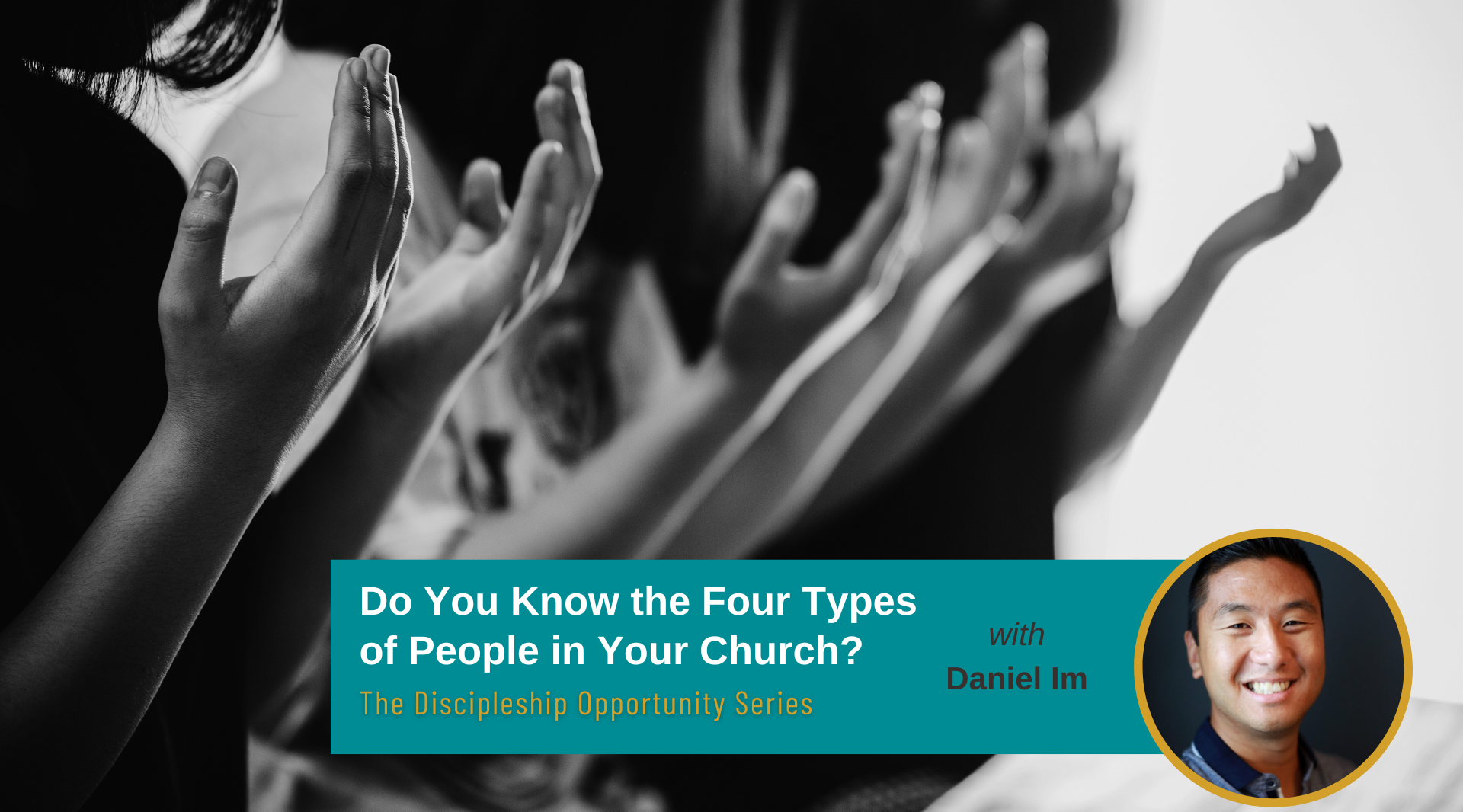This is a series of five posts based on Pastor Daniel Im’s book, The Discipleship Opportunity: Leading a Great-Commission Church in a Post-Everything World. In this first post, Daniel explains each of the four types of people in your church. In each consecutive post, Daniel equips you to help disciple a person where they’re at.
Jesus never said that He might build a few churches—if the conditions are ideal, or if He has the right leaders in place. No, Jesus said that He will build His church, and that nothing and no one can or will ever overpower, overcome, or prevail against her—not even the gates of hell (Matthew 16:18). Jesus is the master builder and the cornerstone. He is the King of kings and the Lord of lords. And we, the church, are His beloved bride. So no matter what comes our way, Jesus will always prevail and conquer—in His perfect timing— because He loves us, He cares for us, and He gave Himself for us.
This means that regardless of what has happened to your church, or what is happening right now, He’s got this. He is your shepherd and defender. He is protecting and leading you with His rod and His staff. And He will renew your life and your church by leading you along the right path for His name’s sake (Psalm 23). If we want to be healthier, stronger, and better able to fulfill Jesus’ command to make disciples of all nations, we need a new discipleship strategy. This is the wonderful opportunity before us.
Taking the Spiritual Temperature of Your Church
Do you know the people in your church? I’m referring to your church right now, your regulars. I’m not just asking if you know their names or would recognize them at the grocery store. I’m asking if you know their stories, their pain, their joy, and how they came to know Christ. Do they know Christ? Did they come to know Christ at your church? Do they want to be known by Christ? Do they want to make Christ known? I recognize these are difficult questions to answer for churches that are larger than fifty people, but it’s important that church leaders try to take the spiritual temperature of their church from time to time.
The Interested/Uninterested Matrix
Just like our communities and churches have people everywhere along the non-Christian to Christian scale, the same is true with the uninterested and the interested—it’s also a scale. When you put both scales together, you get the Interested/Uninterested Matrix.
Let’s further define each quadrant in this matrix.
- Sleepers are spiritually asleep. They’re non-Christian and uninterested in both Jesus and the church. They are like the seeds that fell along the path, got trampled on, and then were devoured by birds. At one point in their lives, sleepers might have attended a Christmas Eve or Easter service and heard the gospel, or a friend or neighbor might have talked to them about Jesus, but none of it took root. They are like “those who have heard and then the devil comes and takes away the word from their hearts, so that they may not believe and be saved” (Luke 8:12). For our work to be effective, the Holy Spirit must loosen the soil of their hearts and open their minds to the things of God.
- Seekers are beginning to wake up. They haven’t yet decided to surrender their lives to Jesus, but they’re interested in Jesus and the church. They engage in spiritual conversations with you. They come when you invite them to church—and sometimes on their own. And they occasionally pray. The spiritual seeds that you’ve planted and watered are beginning to sprout, but we don’t yet know what soil they landed on. Seekers could be like the seeds that fell on the path, on the rock, among the thorns, or on good ground.
- Consumers are Christian. At some point in their lives, they decided to follow Jesus, but for one reason or another, they’re not that interested in Jesus or the church anymore. They are like the seeds that fell on the rock and grew up, but later withered away because they lacked moisture. They are like “those who, when they hear, receive the word with joy. Having no root, these believe for a while and fall away in a time of testing” (Luke 8:13). Alternatively, consumers are like the seeds that fell among the thorns and grew, but got choked by the “worries, riches, and pleasures of life, and produce no mature fruit” (Luke 8:14).
- Disciples are also Christian, but unlike consumers, they are actively growing in their relationship with Jesus because they are interested in Jesus and the church. They are like the seeds that fell on good ground and grew up—so much so that they are now producing fruit a hundred times what was sown. They recognize that every disciple is called to be a disciplemaker, so they are intentionally walking with others. They are “the ones who, having heard the word with an honest and good heart, hold on to it and by enduring, produce fruit” (Luke 8:15).
A Specific Role to Play
Have you ever considered whose responsibility it is to awaken the spiritually sleeping and dead into a vibrant relationship with Christ? Or whose responsibility it is to grow the spiritual seeds that you’ve planted and watered through your preaching, discipleship, and evangelism? While individual disciples and the gathered church have a specific role to play in each of those processes, the ultimate responsibility lies with the Holy Spirit. It is the Spirit who will build the church and make sure that the gates of hell never prevail against her. Perhaps you believe this to be true, but do your actions show it?
You are likely already aware of the subtle ways that non-Christians and Christians have different postures toward Jesus and the church, but perhaps you just didn’t have language for it. I hope this post has given you a fresh framework for thinking about the people in your church and community. This mindset shift is the first step toward building a great-commission church in a post-everything world. In each of the subsequent posts, we will start by identifying who the sleepers, seekers, consumers, or disciples are in your church and community. You will then be equipped with tools to map out your unique plans to reach them. After that, you will learn how to adjust your pathway to disciple them.

In our next post, we’ll learn about how to walk alongside those who don’t know Christ (the sleepers).

Daniel Im
is a pastor, Bible teacher, writer, and podcast host with a passion for the local church. He is the lead pastor of Beulah Alliance Church and the author of No Silver Bullets, Planning Missional Churches, and You Are What You Do: And Six Other Lies about Work, Life, and Love. He lives in Edmonton, Alberta with his wife Christina and their three children. For more information, visit danielim.com and connect with him on social media @danielsangi.
Are you a pastor or know a pastor? Join a thread of posts about preaching to the four types of church-goers here.


